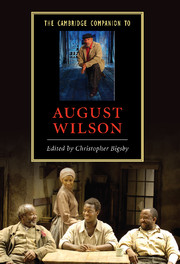Book contents
- Frontmatter
- 1 August Wilson: the ground on which he stood
- 2 Been here and gone
- 3 August Wilson’s relationship to black theatre: community, aesthetics, history and race
- 4 Music and mythology in August Wilson’s plays
- 5 Gem of the Ocean and the redemptive power of history
- 6 Joe Turner’s Come and Gone
- 7 Ma Rainey’s Black Bottom: cutting the historical record, dramatizing a blues CD
- 8 A piano and its history: family and transcending family
- 9 The tragedy of Seven Guitars
- 10 Safe at home?: August Wilson’s Fences
- 11 Two Trains Running: blood on the tracks
- 12 Jitney, folklore and responsibility
- 13 King Hedley II: in the midst of all this death
- 14 Radio Golf: the courage of his convictions - survival, success and spirituality
- 15 Critics on August Wilson
- 16 An interview with August Wilson
- Index
15 - Critics on August Wilson
Published online by Cambridge University Press: 28 January 2008
- Frontmatter
- 1 August Wilson: the ground on which he stood
- 2 Been here and gone
- 3 August Wilson’s relationship to black theatre: community, aesthetics, history and race
- 4 Music and mythology in August Wilson’s plays
- 5 Gem of the Ocean and the redemptive power of history
- 6 Joe Turner’s Come and Gone
- 7 Ma Rainey’s Black Bottom: cutting the historical record, dramatizing a blues CD
- 8 A piano and its history: family and transcending family
- 9 The tragedy of Seven Guitars
- 10 Safe at home?: August Wilson’s Fences
- 11 Two Trains Running: blood on the tracks
- 12 Jitney, folklore and responsibility
- 13 King Hedley II: in the midst of all this death
- 14 Radio Golf: the courage of his convictions - survival, success and spirituality
- 15 Critics on August Wilson
- 16 An interview with August Wilson
- Index
Summary
The only research I do is to listen to the music. There's a lot of history of our people in the music. When I was writing Ma Rainey's Black Bottom, I didn't want to know anything about Ma Rainey. I figured what I needed to know I'd get out of her music. Listening to her singing gave me a good sense of who she was . . . When I did Joe Turner's Come and Gone, I certainly did not think about anything that happened in 1911, but I had a sense that they didn't have cars but had horses. And I envisioned people coming into the cities, and there were boarding houses and people setting down roots. I believe if you do research, you're limited by it . . . It's like putting on a straitjacket.
August WilsonIt is not for nothing that Harry J. Elam, Jr.'s 2004 book is entitled The Past as Present in the Drama of August Wilson, in that it acknowledges the extent to which Wilson's plays, set in the past, nonetheless address current concerns. Wilson may not have been interested in conducting historical research but he was concerned to trace the history of individual lives and the unfolding story of the African American community in such a way that present attitudes and values are seen in the context of past experiences.
Some critics have chosen to treat the plays as if they were written in the era in which they are set. So, for example, a number of articles approach Ma Rainey's Black Bottom (1984) in terms of the history of the blues (Adell, Crawford, Gener, Mills, Plum, Smith, Snodgrass, Taylor), or jazz (Hay, Werner, Wolfe); the Great Migration (Anderson, Bogumil, Gates, Pereira, Shannon 'Transplant'); the conflicting views of African spirituality versus African American Christianity (Richards, Shannon 'Good Christian'); patriarchal roles (Brewer, Clark, Hampton, Sterling); women's roles (Elam 'Women', Kubitschek, Marra); 'Southernness' (Gantt) or 'folk traditions' (Harris).
- Type
- Chapter
- Information
- The Cambridge Companion to August Wilson , pp. 193 - 201Publisher: Cambridge University PressPrint publication year: 2007
- 1
- Cited by

